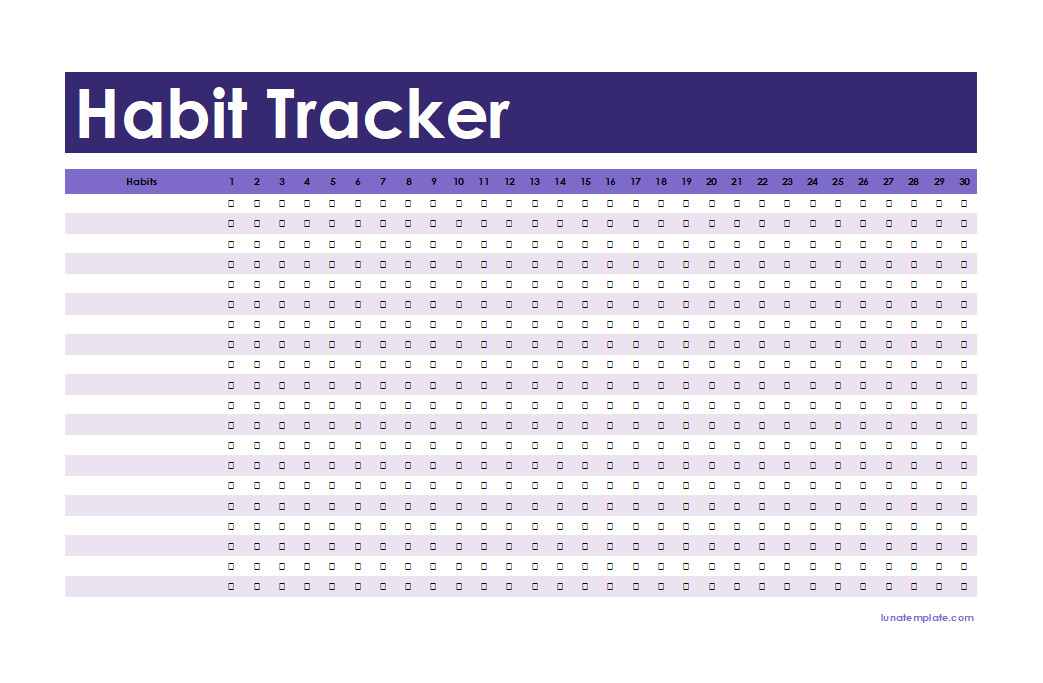Do you ever find yourself struggling to stick to your goals or develop new habits? It can be challenging to stay on track, especially when life gets busy. That’s where a habit tracker can come in handy. This simple tool allows you to measure whether you’re consistently practicing a habit, gives you insight into your habits, and can motivate you to learn something new.
This article will explore what a habit tracker is, how it works, the benefits of habit tracking, examples of habits to track, and the key to successful habit tracking.
What Is a Habit Tracker?
A habit tracker is a visual tool that helps you monitor your progress in developing and maintaining habits. It can be as simple as a template or a digital app. The tracker consists of a grid or chart where you can mark off each day that you successfully practice your desired habit.
By tracking your habits, you create a visual representation of your progress, which can be highly motivating and provide valuable insights into your behavior patterns.

How Does a Habit Tracker Work?
A habit tracker works by providing a visual representation of your habits over time. The tracker typically consists of a grid or chart with columns representing the days of the month and rows representing different habits. Each day, you mark off whether you completed the habit or not. Over time, you’ll see patterns emerge and gain a better understanding of your habits.
Using a habit tracker can help you stay accountable and motivate you to stick to your goals. It provides a tangible way to measure your progress and celebrate your successes. Additionally, the act of tracking your habits can increase self-awareness and encourage self-control and goal-directed behavior.
What Are the Benefits of Habit Tracking?
Habit tracking offers a range of benefits for personal development and behavior change. Here are some key advantages:
- Increased self-awareness: Habit tracking allows you to observe your habits objectively and identify patterns or triggers that may be influencing your behavior.
- Motivation and accountability: The visual representation of your progress can motivate you to stay consistent with your habits and hold yourself accountable.
- Insight into behavior patterns: By tracking your habits, you may uncover patterns or trends that can help you understand why you engage in certain behaviors and how to modify them.
- Goal setting and achievement: Habit tracking can help you set specific and measurable goals, making it easier to track your progress and celebrate milestones.
- Improved self-discipline: Consistently tracking your habits can enhance your self-discipline and strengthen your ability to resist temptation or distractions.
- Positive reinforcement: Seeing your progress on a habit tracker provides a sense of accomplishment and reinforces positive behaviors.
- Flexibility and adaptability: Habit trackers can be customized to fit your specific needs and goals, allowing for flexibility and adaptation as circumstances change.
Examples of Habits to Track
There is a wide range of habits you can track using a habit tracker. Here are some examples:
- Exercise: Track whether you engage in physical activity each day, such as going for a run, doing yoga, or going to the gym.
- Healthy eating: Monitor your food choices and track whether you’re meeting your daily intake of fruits, vegetables, or water.
- Reading: Keep track of the number of pages or chapters you read each day to encourage a consistent reading habit.
- Journaling: Track whether you write in your journal each day to promote self-reflection and emotional well-being.
- Meditation: Monitor your meditation practice and track the duration or frequency of your sessions.
- Productivity: Keep track of your daily tasks or goals to enhance productivity and time management skills.
- Gratitude: Track whether you write down things you’re grateful for each day to cultivate a positive mindset.
The Key To Successful Habit Tracking
While habit tracking can be a powerful tool, it’s essential to approach it with the right mindset and strategies for success. Here are some key tips for effective habit tracking:
- Start small: Begin with one or two habits to track initially. Trying to track too many habits at once can become overwhelming and lead to burnout.
- Be consistent: Make habit tracking a daily practice. Set a specific time each day to update your tracker and reflect on your progress.
- Be honest: It’s crucial to be honest with yourself when marking off habits. If you didn’t complete a habit, acknowledge it and use it as an opportunity for growth.
- Celebrate milestones: When you reach a milestone or achieve a goal, take the time to celebrate your progress. Rewarding yourself can reinforce positive habits.
- Adjust as needed: Be flexible and adapt your habit tracker as your goals or circumstances change. Modify or add habits that align with your current priorities.
- Use reminders: Set reminders or notifications to help you remember to update your habit tracker. This can be especially helpful when establishing a new habit.
- Reflect and learn: Regularly review your habit tracker and reflect on your progress. Use the insights gained to adjust your habits or set new goals.
In Conclusion
A habit tracker provides a simple and effective way to measure and improve your habits. By tracking your habits, you gain valuable insights into your behavior patterns, stay motivated, and develop self-control and goal-directed behavior.
Remember to start small, be consistent, and celebrate your milestones along the way. With the right approach, habit tracking can be a powerful tool for personal growth and positive change.
Habit Tracker Template – Excel